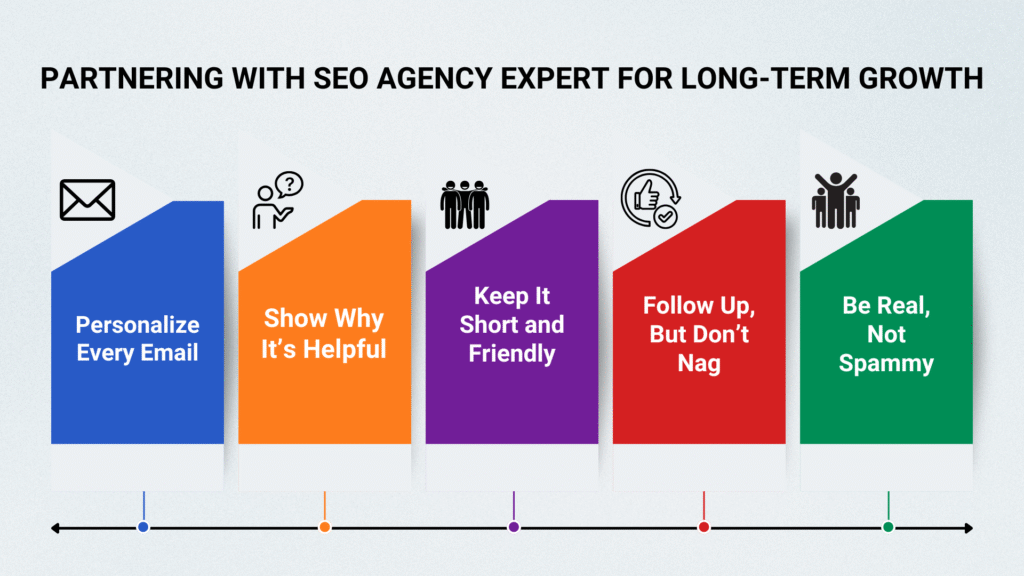If you have an online store, you need more people to visit it. One way to do that is by getting other websites to link to yours. These are called Ecommerce Backlinks. When trusted sites link to your store, search engines like Google think your site is helpful and show it higher in results. But getting links to product pages isn’t easy. Most people don’t want to link to pages that sell things. That’s why you have to make your pages better by adding guides, helpful tips, or answers to common questions. You can also write for other blogs, share tools, or team up with bloggers in your niche. It’s not about tricking anyone, it’s about giving useful stuff that others want to share. Getting good Ecommerce Backlinks takes time, but it helps your store grow. The better your links, the more people will find and trust your website.
How to Build Backlinks for Ecommerce
Running an online store is not just about having good products or a nice-looking website. If people can’t find your store online, they won’t visit it and they definitely won’t buy anything. That’s where backlinks come in.
Backlinks are links from other websites that point to your store. When a trusted website links to yours, search engines like Google see that as a sign your store is helpful, real, and worth showing to more people. In simple words, the more good websites that link to yours, the better your store can rank on search engines.

Why backlinks matter more for ecommerce sites
Ecommerce brands aren’t just competing locally, they’re up against global companies and niche powerhouses. Winning isn’t only about better pricing or sleek design. It’s about credibility and backlinks are one of the strongest trust signals search engines use. When reputable websites link to your store, it tells search engines your content is valuable and trustworthy. Without those links, even a beautiful ecommerce site may never gain the authority it needs to rank. Also, ecommerce sites change often, products shift, campaigns rotate, and customer needs evolve. A strong backlink profile helps maintain visibility through all those changes. Top-ranking ecommerce brands almost always have solid backlink portfolios from authoritative domains. If you want real growth, backlinks need to be part of your strategy from the beginning. Top-ranking ecommerce brands almost always have solid backlink portfolios from authoritative domains. If you want real growth, backlinks need to be part of your strategy from the beginning.
How ecommerce backlink building differs from other sectors
Backlink building isn’t one-size-fits-all. Ecommerce comes with unique challenges. You’ll need backlinks not just to blog posts, but to product pages, category pages, and buying guides. While people often link to informative blog content, getting links to a product page selling, say, kitchen blenders, is much tougher. Many website owners shy away from linking to product pages because it might seem like an endorsement. That’s why ecommerce backlink building requires extra creativity and diplomacy. The advantage? Ecommerce sites can create customized product and category pages that serve as resources not just sales pages. The goal is to make pages others are comfortable linking to because they genuinely offer value.
So how do you fix that?
You have to make your product and category pages better. Add extra value. Include guides, helpful tips, or answers to common questions. For example, instead of just showing a jacket, add a sizing guide, fabric care tips, or a video showing how to style it. This makes the page more useful and more link-worthy.
The goal is simple: make your product pages feel helpful, not just like sales pages.
Effective strategies for building ecommerce backlinks
There’s no shortcut but there are proven strategies that work when done right.
Create resources people actually want
Content like buying guides, how-to articles, and comparison pieces are backlink magnets if they’re truly useful. A sports gear store might publish a guide on choosing the right running shoes for different surfaces. A tech shop could offer a comparison of gaming laptops under $1000. The more helpful your content, the more likely others will link to it naturally.
Contribute guest posts with substance
Guest posting still works, but only when it adds value. Editors don’t want thin content or sales pitches, they want helpful, relevant articles. Identify blogs and sites your audience reads. Pitch useful content ideas that align with their themes. Include insights, real examples, or tips that stand out. A link back to your store should feel like a natural part of the content not something forced in.
Collaborate with people who influence your audience
Influencer backlinking doesn’t mean chasing celebrities. It means working with niche bloggers, micro-influencers, or community leaders whose opinions matter. Partner with them on reviews, interviews, or product roundups. These partnerships bring backlinks and brand exposure in a more meaningful way than big media mentions.
Build genuinely linkable assets
Useful tools and resources often get shared and linked over time. Think of calculators, checklists, printables, or templates. If it helps solve a problem or make life easier, it’s got backlink potential. For example, a furniture store could create a downloadable room layout planner. A skincare brand might share a seasonal skincare routine calendar.
Engage with journalists and news outlets
Platforms like HARO (Help a Reporter Out) and Response Source connect you with journalists looking for expert input. A quick, helpful response can earn a high-authority backlink. Selling sustainable products? Respond to a journalist asking for tips on eco-friendly packaging. The result? A valuable mention on a trusted site.
Build relationships, not just links
Partner with local charities, events, or trade groups. Sponsorships and collaborations naturally lead to backlinks and those connections can drive brand goodwill too.Choose partners that align with your values. Authentic relationships create stronger, more lasting results. A digital Marketing agency helps brands grow backlinks with smart, ethical outreach and strategy.

Tips for smarter outreach
Be Human, Not a Robot
When you send an email asking someone to link to your website, always make it personal. Nobody likes those emails that feel like they were sent to 1,000 people at once.
Read their blog first. Learn what they care about. Use their name. Say something real. This shows that you took time and that you care about their site, not just your own.
Say Why It Helps Them
Don’t just say, “Please link to my article.” That doesn’t work.
Instead, tell them how your content helps their readers. Maybe your guide answers a question their audience often asks. Maybe your page includes a free tool that makes their blog post even more useful.
Focus on what’s in it for them, not just what you want.
Keep It Short and Friendly
Long emails are hard to read. Keep your message short and easy to understand. Be polite and write like you’re talking to a real person not like you’re writing a school essay.
A simple message that says who you are, why you’re writing, and how your content could help is more than enough. Don’t try too hard to impress.
Don’t Be Pushy
Follow up once if they don’t reply, but don’t keep sending emails over and over again. People are busy. If they like your content, they’ll reply. If not, it’s okay. You can always ask someone else.
Being respectful makes a good impression. It shows that you’re not just trying to get a link, you’re trying to build a real connection.
Write Like a Real Person
Spammy messages get ignored. Messages that sound too salesy or copied from a script get deleted.Be real. Be honest. Be helpful. That’s how you stand out. Even if you’re not perfect at writing, people will respond better to a short, kind email than to a perfect but fake-sounding message.
Mistakes that can undo your hard work
Even when you’re trying your best, things can still go wrong. Backlinks can help your store grow, but the wrong kind of backlinks can actually hurt your site. Let’s look at the most common mistakes people make and how you can avoid them.
1. Buying Bad Links
Paying someone to give you backlinks might seem like a shortcut, but it often causes problems. Most of these paid links come from websites that don’t have real visitors or are full of spam. These low-quality links might even break the rules set by search engines like Google.
Instead of helping you rank higher, these links could cause your site to drop in search results or even disappear from them completely. It’s always better to earn links the right way, by sharing helpful content or building honest relationships.
2. Using Too Many Keywords in Links
You may have heard that keywords help you rank better. That’s true but only if you use them naturally.
For example, writing a link like “best cheap shoes online free shipping today” inside every backlink looks fake. That’s called keyword stuffing. It doesn’t help. It can actually confuse search engines or make your content look unnatural.
Use words that fit the sentence and sound real. A good link might simply say “check out this shoe store” or use your brand name.
3. Asking for Links from the Wrong Sites
Not every backlink is a good one. Some websites may be active, but they have nothing to do with what you sell.
If you have a pet supply store, but you’re getting links from a travel blog or a cooking site, that doesn’t make sense to Google. These mismatched backlinks don’t carry much value and may even look suspicious.
Always try to get links from websites that are related to your product or audience. That way, the link feels natural and makes sense.
4. Forgetting to Improve Your Own Website
Backlinks are important, but they’re not magic. If your website is messy, slow, or hard to use, backlinks won’t save it.
Make sure your pages are easy to read, your pictures load fast, and your checkout process works smoothly. If visitors click a link to your site and leave right away because something is broken, that hurts your ranking.
Fix your own website first then go after backlinks.
5. Only Getting One Type of Link
There are two main types of links: dofollow and nofollow. Dofollow links pass on value to your site, and nofollow links don’t—but both are useful.
Some people try to get only dofollow links, thinking they’re the “good” ones. But Google prefers a mix of both. That looks more natural and honest.
If all your links are dofollow, it might look like you’re trying to cheat the system.
6. Getting Links Too Fast
If your site gets 200 backlinks in just two days, Google may wonder if something weird is going on.
That’s not how real backlinks grow. A natural backlink profile grows slowly over time. You might get five this week, ten next month, and more as your business grows.
Slow and steady is the safe way to build trust with search engines.
7. Copying Other People’s Work
If your content is copied from another website, it won’t get good backlinks. People don’t want to link to something they’ve already seen somewhere else.
Also, search engines can tell when content is duplicated. They’ll often ignore the copy and reward the original source.
Always try to write your own descriptions, tips, and guides even if it takes more time.
8. Leaving Links in Spammy Comments
Some people leave links to their site in random blog comments or forums, hoping to get a quick backlink. This usually doesn’t work.
Most of those comment sections are full of spam, and the links don’t carry much value. In fact, too many of these can make your site look shady.
If you’re going to comment somewhere, do it to join the conversation, not just to drop a link.
9. Ignoring Mobile Users
A lot of people shop on their phones now. If your website doesn’t work well on a mobile screen, they’ll leave quickly even if they found your page through a good backlink.
Search engines notice when people leave right away. This is called a bounce, and it can make your rankings go down.
So before chasing backlinks, make sure your site looks and works great on phones.
10. Not Checking Where Your Links Come From
Some links help, some links hurt. If you’re not checking where your backlinks come from, you won’t know which ones to keep.
Use free tools like Google Search Console to track your backlinks. If you find links from spammy or unsafe sites, you can ask Google to ignore them using the disavow tool.
Why working with specialists saves time and effort
Even with all this, building good backlinks still takes time, research, and practice. That’s why many ecommerce business owners work with specialists who understand how link building works. These are people or teams who spend all day studying search engines, backlinks, and online trends. They know which websites are safe and trusted, and which ones to avoid. They also know how to reach out to bloggers, website owners, or news sites without sounding fake or spammy. Working with specialists saves time because they already have the tools and the know-how. You won’t have to waste hours searching for websites to contact or writing emails that don’t get any replies. A reliable digital marketing service can help you uncover real backlink opportunities that actually move the needle for your ecommerce store. Instead of guessing, they focus on building quality links that improve visibility and drive traffic. They also know how to craft anchor text that sounds natural—so it blends in, looks trustworthy, and doesn’t raise red flags with search engines. Most importantly, experienced digital marketers avoid risky tactics. While some store owners fall into the trap of buying links or using shortcuts that backfire, a good digital marketing team sticks to safe, ethical strategies that follow Google’s rules. This keeps your site in good standing and builds long-term growth.
Unique Challenges of Ecommerce Link Building
Building links for an ecommerce website is not as simple as it sounds. It’s different from writing a blog or running a news site. Most blogs and news sites share helpful stories, tips, or ideas. People are usually happy to link to those kinds of articles because they give readers something useful. But online stores are mainly made to sell things. This makes it harder to get other websites to link to them. Let’s say your store sells kitchen blenders. You might have a product page with a photo, price, and “Buy Now” button. Even if the blender is great, why would another website link to that page? It might feel too much like advertising. Many website owners don’t want to look like they’re promoting someone else’s product for free. So, they stay away from linking to those pages.
That’s one of the big problems with building backlinks for ecommerce sites. You need links not just to your homepage or blog, but also to your product pages, category pages, and buying guides. These are the pages you really want people to visit, because they lead to sales. But getting backlinks to those kinds of pages takes more effort, planning, and creativity. One way to get around this is by making your product pages more helpful. Don’t just show the product and its price. Add extra things like size charts, videos, tips on how to use the product, or answers to common questions. If a product page becomes more than just a sales page, other websites might feel better about linking to it. For example, instead of just selling a camping tent, add a full guide on how to set it up or pick the right tent for different seasons. Now your product page is also a helpful resource.
Another challenge is writing content that people actually want to share. Ecommerce stores don’t always focus on content. But writing helpful blog posts or buying guides can make a big difference. These articles can answer common questions or help people make smarter choices. Once you have content that people find useful, they’re more likely to link to it.
Partnering with SEO agency Expert for Long-Term Growth
Getting more people to visit your online store isn’t only about using the right tools. It’s also about talking to people the right way. When you work with an SEO agency that knows how to build backlinks, you save time and avoid mistakes. Below are five ways a good SEO agency handles backlink outreach, each explained in simple words.
1. Personalize Every Email
Most people can tell when an email is copy-pasted. It doesn’t feel real, and it’s easy to ignore. A good SEO agency takes time to learn about the person or website they’re writing to. They use real names and mention something specific about the site. This shows that the message is meant for them, not just sent to a big list. Personalized emails get more replies because they feel like a real conversation. When done right, people feel respected and they’re more likely to link to your site. It’s a small step that makes a big difference.
2. Show Why It’s Helpful
No one wants to be used for free traffic. That’s why SEO experts always explain why their content is helpful to the person they’re writing to. They don’t just say, “Please link to my blog.” Instead, they say something like, “This guide could help your readers choose the right product.” This makes the email feel less like an ad and more like an offer to help. When people understand the value, they’re more open to linking to your site. It’s about making the conversation fair for both sides.
3. Keep It Short and Friendly
Long emails can feel like homework. People are busy and don’t want to read big blocks of text. A good SEO agency keeps the message short and easy to read. They use clear words and a friendly tone. They get to the point fast: who they are, why they’re writing, and how it helps. A kind and simple message is more likely to get a reply. It also makes your brand look honest and easy to work with. Short, friendly emails build trust right away.
4. Follow Up, But Don’t Nag
Sometimes, people don’t reply to your first email. That’s okay, they might be busy. A smart SEO team sends one follow-up message a few days later. This gives the person a second chance to read and reply. But they don’t keep sending messages again and again. That gets annoying and can hurt your brand. One gentle reminder is enough. If the person isn’t interested, the agency moves on to the next contact. Being polite and knowing when to stop is part of good outreach.
5. Be Real, Not Spammy
Nobody likes getting spam. That’s why SEO experts write like real people. They don’t use tricks, fake stories, or try to sound too smart. They just talk like someone having a normal conversation. People can feel the difference. When you sound honest and friendly, your email gets more attention. Real emails build real relationships and that’s what leads to good backlinks. A real message might not be perfect, but it will always work better than one that sounds fake or forced.
When you work with an SEO agency that knows how to build backlinks, you save time and avoid mistakes. Learn more about how our SEO services can help your store grow

How to Attract Backlinks to Category Pages
Getting other websites to link to your product or category pages can be tough. People usually like linking to blog posts or how-to guides. But when it comes to linking to a page full of products for sale, they hesitate. It feels too much like advertising. That’s why you have to make those pages feel less like sales pages and more like resources. Let’s say you have a category page called “Men’s Running Shoes.” If the page only shows products, people may not want to link to it. But if you add helpful text at the top like “How to Choose the Right Running Shoes for Your Workout” it becomes more useful. You could add tips, explain the difference between shoes for jogging vs. long-distance running, or even include size guides and customer reviews.
Another idea is to create seasonal buying guides. For example, a clothing store could update their “Winter Jackets” category with a short section that explains which jackets are best for snow, rain, or wind. These little extras turn simple category pages into useful resources. That’s what makes other websites more willing to link to them.
Real Examples of Ecommerce Backlink Strategies That Work
Many online stores use smart, honest ways to earn backlinks. These are things any business can try with no big budget needed.
Example 1: Create a Helpful Guide
A store that sells cookware can write an article called “How to Choose the Right Non-Stick Pan.” Inside the guide, they link to their pans. A food blog sees the article, finds it useful, and links to it. Now that page has a strong backlink.
Example 2: Partner with Small Influencers
A baby product shop sends a free high chair to a mom blogger. The blogger reviews it and links to the product page. It’s a win for both the store gets a backlink, and the blogger gets helpful content for her readers.
Example 3: Offer Free Tools or Printables
A stationery store offers a free downloadable weekly planner. A teacher blog finds it and shares the link with their readers. These types of tools keep working for months or even years, bringing in traffic and backlinks.
Example 4: Be Part of Expert Roundups
Many websites ask for short tips from business owners. For example, “What’s one tip for building a brand on a small budget?” You send in a quick answer. If they use it, they link back to your store as your business name gets featured.
These examples prove that you don’t need to cheat or spend a lot of money to get backlinks. You just need to offer something helpful, honest, and useful.
Final Thought
Getting your ecommerce site to show up on the first page of Google takes effort. Backlinks are one of the most powerful tools to help you get there, but they work best when you focus on real value and real people. You don’t need to be fancy. You don’t need tricks. Just offer something helpful, reach out kindly, and track your results.
Make your category pages worth linking to. Write guides that answer real questions. Offer printables or tools that save time. Build friendships with bloggers and experts. And use tools to check your progress along the way.
When you do these things the right way, your links will grow and so will your business.
Frequently Asked Questions About Ecommerce Backlinks
Q1: What is a backlink?
A backlink is a link from another website that leads to your site. It’s like someone online giving your store a thumbs-up.
Q2: Why are backlinks important for SEO?
Backlinks help search engines see your site as trustworthy. The more good backlinks you have, the higher your site may rank in search results.
Q3: Can I get backlinks to product or category pages?
Yes, but you need to make those pages helpful—add guides, tips, or videos. That makes them more shareable.
Q4: Should I pay for backlinks?
No. Buying backlinks can get your site in trouble. It’s better to earn them naturally by offering value.
Q5: How long does it take to see results from backlinks?
Sometimes a few weeks, sometimes a few months. SEO takes time, but the results can last a long time.
Q6: Are all backlinks the same?
No. A backlink from a strong, trusted site is more powerful than one from a small, spammy site. Quality is more important than quantity.
Q7: What if I get a bad backlink?
You can ask Google to ignore it using the disavow tool. But if you focus on honest link building, you usually don’t need to worry.
Q8: Do social media links count?
They don’t help search rankings much, but they do bring traffic and can help others discover your content.
Q9: What’s anchor text, and does it matter?
Anchor text is the clickable word or phrase used in a link. It should feel natural. Don’t stuff it with keywords.
Q10: Should I check my backlinks often?
Yes! It’s smart to keep an eye on your backlinks regularly to see what’s working and what’s not.





